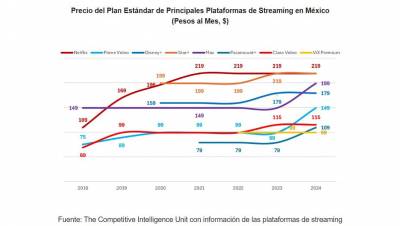What has made telenovelas a strategic enclave of Latin American audiovisual production is both their weight in the television market and the role they play in the cultural recognition of these peoples. This poses different meanings and scopes to what is happening at the national and transnational levels.
Not only in Brazil, Mexico and Venezuela –the main exporting countries–, but also in Argentina, Colombia, Chile and Peru, the telenovela occupies a decisive place in the national television production capacity, that is, in the consolidation of a television industry, in the modernization of its processes and infrastructures –technical, financial – and in the specialization of their resources: librettists, directors, cameramen, sound designers, set designers, editors. The production of telenovelas has meant in turn a certain appropriation of the genre by each country: its nationalization. For although the telenovela genre implies rigid stereotypes in its dramatic scheme, and strong conditioning factors in its visual grammar, reinforced by the standardizing logic of the world television market, it is also true that each country has made the telenovela a particular place of crosses between television and other cultural fields, like literature, cinema, theater.
In most countries it began copying, in some even importing the scripts, in the same way as happened years ago with the radio soap opera when, with the help of Colgate Palmolive, the scripts of Cuba or Argentina were brought. The dependence on the radio format and the conception then of the image as a mere illustration of a "spoken drama" was broken as television was industrializing and the human production teams were "conquering" the new medium, that is, appropriating its expressive possibilities. The telenovela then became a conflictive terrain of cultural redefinitions: while in countries like Brazil they were incorporated into the production of telenovelas, valuable theater actors, film directors, prestigious left-wing writers, in other countries television in general and telenovela in particular were rejected by artists and writers as the most dangerous of traps and the m as degrading of the professional fields. Little by little, however, the crisis of cinema on the one hand and the overcoming of ideological extremisms on the other have been incorporating into television and soap opera many artists, writers, actors who contribute themes and style through which dimensions of life and national cultures pass.
And it is precisely when the telenovela manages to mobilize and incorporate artists, writers and critics into its space, evicting North American series from the most "noble" schedules and with the highest audience on television, when that success will become the springboard towards their internationalization. An internationalization that if on the one hand responds to a movement of activation and recognition of Latin America, marks on the other hand the beginning of a tricky movement of neutralization and erasure of national and regional signs of identity.
The pioneer was Brazil: TV-Globo internationalizes the telenovela exporting its successes to Portugal since 1975, and since the early eighties it sweeps geographical and political borders introducing its telenovelas in Spain, Denmark, England and even in Japan. The slave Isaura is declared the best television program of the last ten years in Poland, and in People's China it seduces an audience of 450 million viewers. Meanwhile, Televisa de México concentrates first on the Latin American field, and on the Hispanic of the United States, and since the mid-eighties restructures its international marketing strategy becoming present in Europe and North Africa with enormous audience successes such as Los ricos también lloran, that will go from Italy to the current Russia. And something similar has happened with the Venezuelan television industry, whose elementary narrative and dramatic exaltation has lately found enormous resonance and fidelity from audiences from the most diverse and remote countries.
In recent years the reordering of national television systems in Europe, the privatization and expansion of the number of channels, cable and the possibilities of satellite connection in our own countries, have increased the programming time pushing an intensive demand for programs and thus opening even more plus the market to Latin American telenovelas. Now Colombia, Chile and Argentina also enter the audiovisual market of the world highlighting the degree of development achieved by Latin American television companies and signifying, the some measure, the opening of gaps in the hegemony of the United States and in the division between a North identified with producing countries and a South had by countries only consumers.
From these facts, and in the face of the compulsive reduction of the valuable only to the measurable in ratings, as it becomes more and more manifest every day, perhaps it is time to ask ourselves if the proposal of an economically cheap and dramatically easy soap opera will not already be slowly killing the goose that lays the golden eggs. Is it true that the globalization of markets means the dissolution of all real difference or its reduction to recipe books of frozen folklore? Or isn't that same market – as the international success of the Colombian novel Café shows us – already demanding processes of experimentation and innovation that allow the diversity of narratives, gestures and imaginaries in which the true richness of these peoples is expressed to be inserted into the languages of a globalized sensibility?
























Leave your comment